Tag: Indentured Daughters
SAAET Project: Lockdown inspires new growth for young women in Nepal
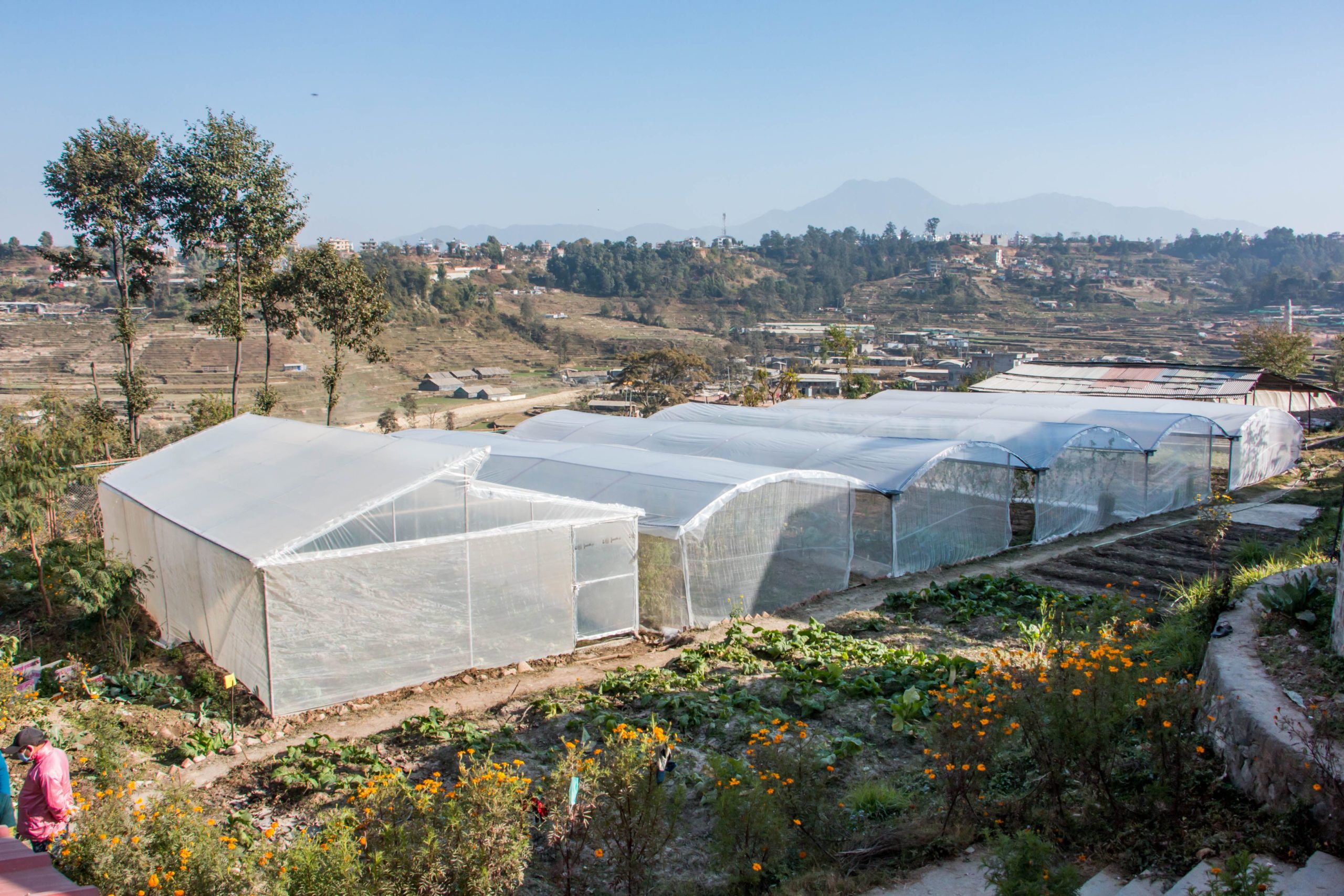
A letter from President Som Paneru
Dear NYF friends and family,
One year ago, just before the pandemic began, NYF was working to engage more women in our vocational education programs. We had seen that most of the young people interested in coming to Olgapuri Vocational School were young men—no matter how hard we tried to encourage young women to apply.
We reached out to families and learned that many young women were anxious about living near a big city like Kathmandu. Others insisted that even if they learned the skills offered—carpentry, plumbing, welding, and electrical—the pervasive culture of workplace sexism in Nepal would ensure they never truly advanced in a career. To these young women, the risks associated with these career goals were simply too great. As we worked to design an enriched program especially for them, the pandemic arrived. Olgapuri Vocational School was forced to shut its doors until further notice.
That is when the pandemic forced us to look at the problem differently.
During the lockdown, a generous donor helped us begin building a beautiful group of greenhouses on the Olgapuri grounds. As I oversaw the progress, I wondered—could we design a pandemic-safe vocational education program for young women that could bring greenhouse technology and training to their villages?
Greenhouses are relatively inexpensive to build and maintain, and can provide an enormous economic benefit to women in rural communities.
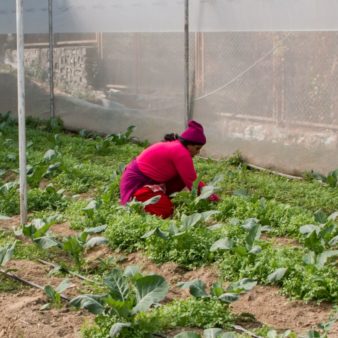
This is how the new SAAET Project was born. Saaet means “an auspicious moment of starting a new journey” – and it stands for Sustainable Agricultural and Entrepreneur Training.
Starting this spring, our greenhouse trainer will travel to rural villages to quarantine and then provide hands-on training to classes of 20 young women each. Students will learn the basics of organic farming, nursery techniques, construction and use of plastic greenhouse and drip irrigation, budgeting, bookkeeping, and more. By the end of the training, each woman will be prepared to manage her own greenhouse—feeding herself and her family with nutrient-rich vegetables, and often making extra income, even during a crisis.
Including the start-up materials for each girl’s fully-functional greenhouse, the project’s cost per village is $7,500. In our first year, we hope to bring the SAAET Project to five villages—or 100 young female entrepreneurs.
I am so grateful for the loving support that has made this project possible during an unprecedented crisis. Your gifts are helping Nepalese young people build towards better health and brighter futures.
Dhanyabad,

Som Paneru
President
Female Lawyers – A New Milestone for the Freed Kamlari Community
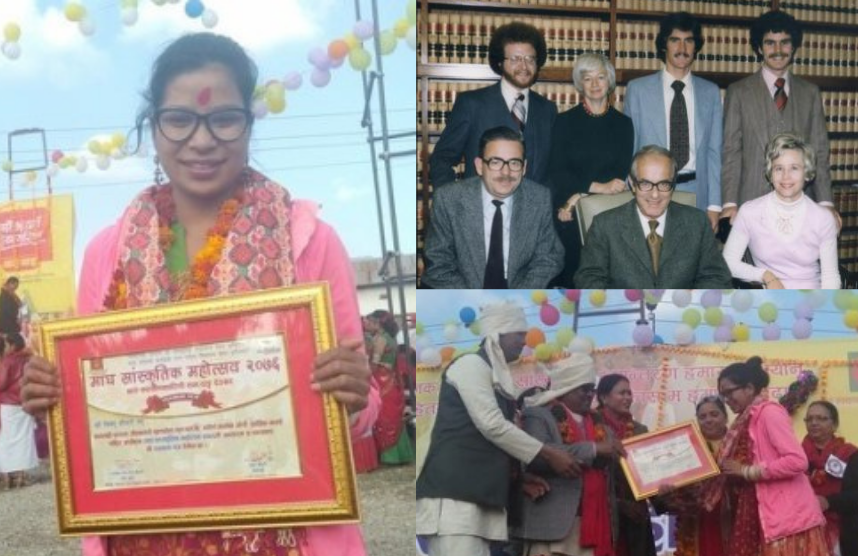
Female lawyers hold a special place in my heart—especially those embarking on this challenging career in a time and place in which women are not always welcome.
For those who do not know me, welcome! I am Olga Murray, the founder of Nepal Youth Foundation. Since the mid-1980s, I have dedicated my life to helping the children of Nepal to achieve their dreams. The work is an incomparable joy! Many of these kids’ successes have absolutely astonished me.
I have recently learned from Som that Bishnu Chaudhary has passed the bar exam in Nepal. This makes her the first Freed Kamlari to become a lawyer.
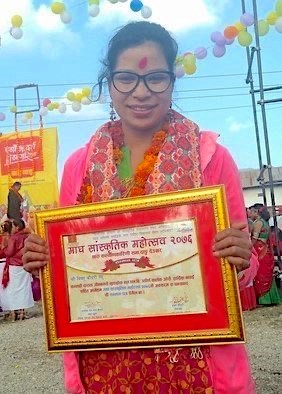
Kitchen Slavery
Bishnu’s father sold her into kamlari bondage when she was ten years old. Initially, he needed her wages to pay off a debt of under $40 (at the current rate of exchange), and later to assure that he could continue to work as a farmer for her employer. If she had stopped working, her family would have been left with no land to farm—and no way to feed themselves.
As a kamlari servant, Bishnu was denied an education and was instead forced to spend her childhood working long hours doing laundry, dishes, housework, and other tasks assigned by her family’s landlord. It was hard, demeaning work in an unforgiving environment. This was no place for a child.
(You can learn more about the kamlari practice, and NYF’s response, here.)
Rescue & Education
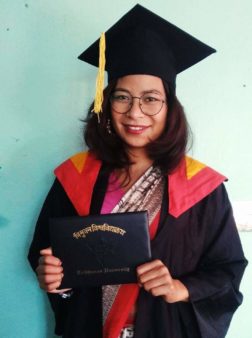
NYF rescued Bishnu from kamlari bondage in 2004, as our Indentured Daughters program (later the Empowering Freed Kamlari program) began to take root in the impacted Tharu communities.
She wanted desperately to go to school, and though her father at first refused, the teachers at the local school convinced him to allow her to enroll. Bishnu proved to be an outstanding student throughout her school years, taking as many opportunities for growth and development as she could. NYF has proudly supported her education from the beginning. Bishnu was admitted to law school in Kathmandu and graduated last year (pictured above).
Social Activism
During her student years, Bishnu was an outspoken and passionate leader in opposing the practice of kamlari, leading rescue operations of indentured children and convincing parents not to send their daughters away. She even risked being expelled from school because she insisted on liberating kamlari who were working for her own headmaster and teachers. Now that’s courage!
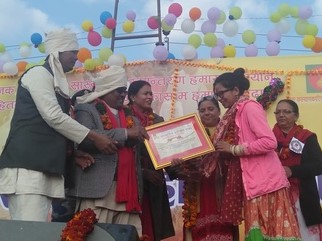
At Maghe Sankranti 2020, before the pandemic, Bishnu’s local government presented her with an award for the work she has done for her community (pictured left). I am gratified to see the ways these women, once mistreated and made to feel worthless, are being recognized and honored for their remarkable achievements.
Bishnu has continued in her activism, providing counseling and advice for former kamlari. Her aim is to advocate for girls and women in all aspects of the law – a tall order in Nepal, where paternalism reigns supreme.
A New Milestone
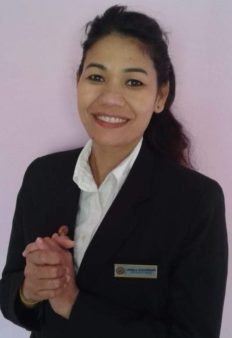
Female lawyers are a new phenomenon for Bishnu’s ethnic minority community, the Tharu. But Bishnu is just the first in the pipeline.
Up next is Urmila (left), the leader and heroine of the anti-kamlari movement, who was indentured at the age of six and did not begin school until she was 18, against the advice of almost everybody. Urmila is in her second year of law school and intends to work in the area of human rights, particularly women’s rights, after graduation.
How exciting to know Tharu women will have powerful female lawyers representing them in Nepal, and showing young girls what women can accomplish!
International Women’s Day 2021
I identify with these young women because, although I have never been sold into indentured servitude, I know the difficulty of embarking on a career in which women were not always welcome. I graduated from law school 66 years ago (gulp!), becoming a female lawyer at a time when there were few women in the profession, and the prospect of looking for a job was terrifying.
I was honored to spend my career in the company of those working to advance the rights of minorities in the United States. Below, I stand with my colleagues as a research attorney for California Supreme Court Justice Stanley Mosk.
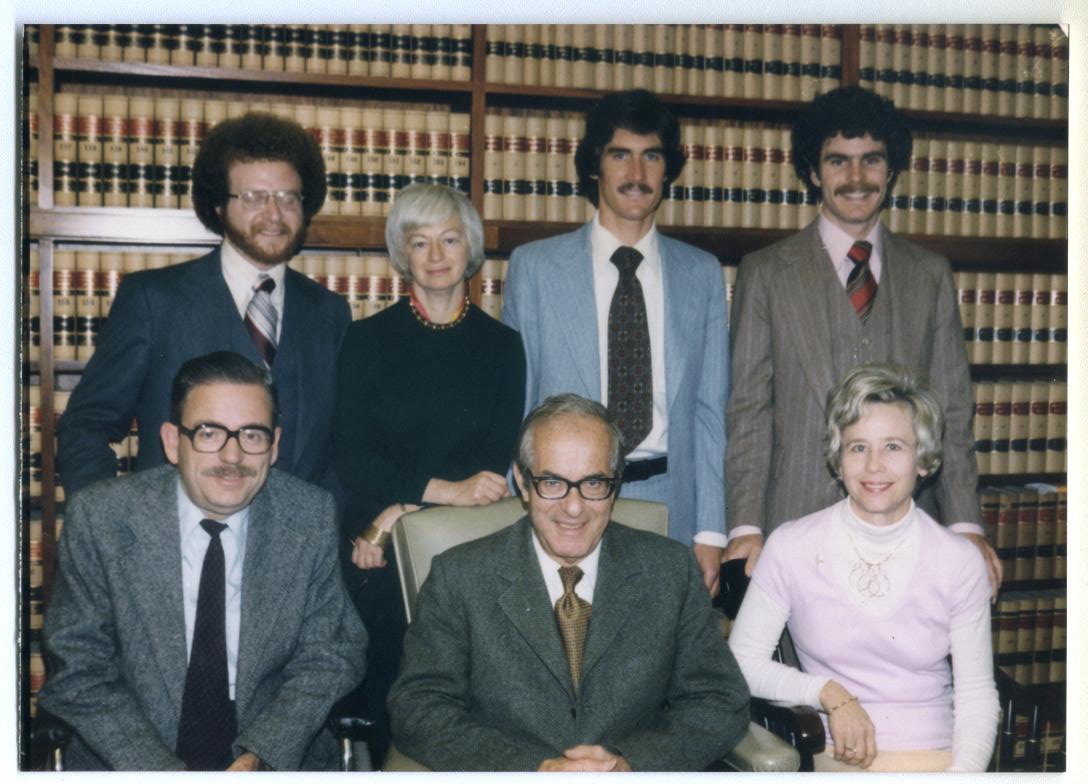
International Women’s Day, now held on March 8th, has been celebrated since 1911, when it was organized in Europe. Women then were campaigning for women’s rights to work, vote, be trained, hold public office, and end discrimination. Other early causes involved labor legislation about safety standards and child labor, combatting violence against women, and agitation for peace.
Now, this day is an opportunity to celebrate women’s achievements, raise awareness about women’s equality, and lobby for change.
The International Women’s Day theme in 2021 is “Choose to Challenge”—something the NYF Family has been doing for over 30 years, and something the Freed Kamlaris have done with gusto.
The work isn’t finished—but change is coming, one milestone at a time.
Today, for the Freed Kamlari communities, Bishnu, Urmila, and other daring women are choosing to challenge the status quo in their countries. I have full confidence that both Bishnu and Urmila will succeed in their goal to improve the status of women in Nepal because of their determination, their smarts, and the lessons they learned in their struggles to overcome injustice.
Maghe Sankranti, NYF and Freed Kamlaris Celebrate 20-Year Journey
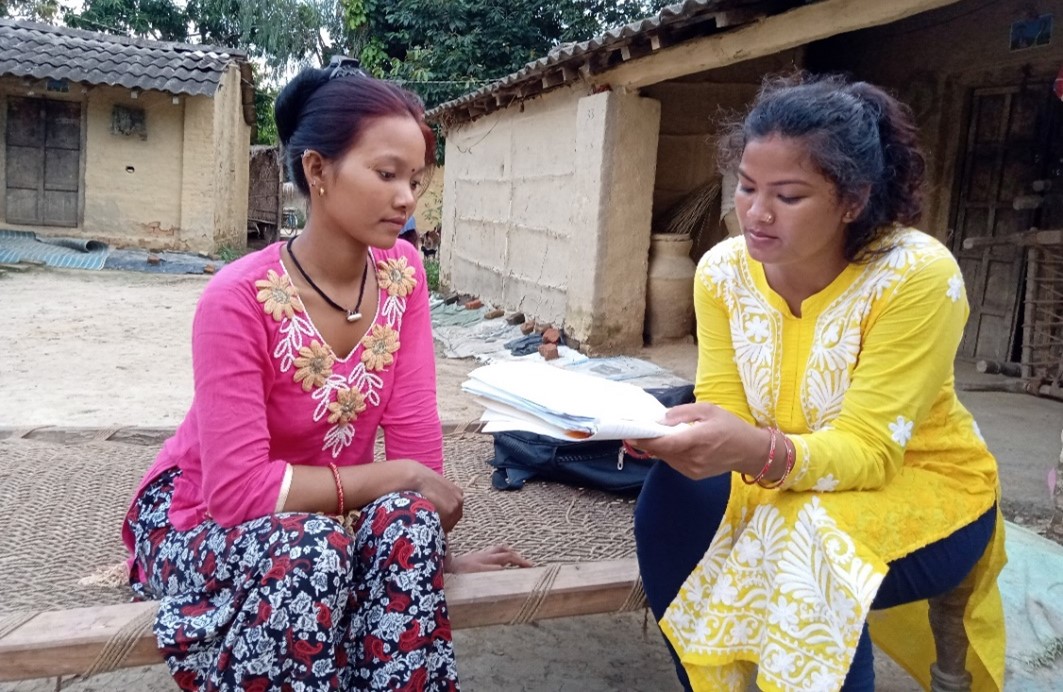
Maghe Sankranti 2021
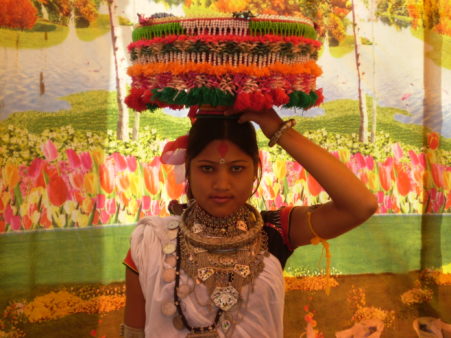
(Above, Jamuna Tharu, a Freed Kamlari and social motivator, prepares to celebrate Maghe Sankranti in 2009.)
Maghe Sankranti – The Tharu people in Nepal’s Terai region celebrate their New Year on Maghe Sankranti, which falls in mid-January. In 2021, that day was January 14th. Happy New Year!
For generations, this auspicious day had a grim meaning for young Tharu girls. Maghe Sankranti was the day the year’s debts came due. On this day, many families settled their debts in the only way available to them: by bonding their young daughters for a year of indentured servitude in the homes of strangers in Nepal’s urban areas. For these girls, some as young as five or six years old, “Happy New Year” meant goodbye to the safety of home—and a frightening journey to a life of kitchen slavery, dehumanization, and abuse. Bonded girls were known as kamlari.
But now, the girls freed from this practice are grown up and ensuring freedom and justice for their sisters. As the Freed Kamlari celebrate Maghe Sankranti this year, they are celebrating hard-won victories built over the past 20 years—including the certainty that the daughters of their minority ethnic group will never again be bonded away.
NYF began fighting the kamlari practice in 2000, with Som Paneru, Olga Murray, and Man Bahadur Chettri leading the way in developing long-term, targeted programming designed to free, heal, educate, and empower the individual girls and to challenge Nepal’s government to eradicate the practice once and for all.
Nepal’s government made the kamlari practice illegal in 2013.
In 2020, we published a three-part series celebrating the Empowering Freed Kamlari program’s transition to Tharu control, the rising leaders of the Kamlari Movement, and the ways the Freed Kamlari Development Forum is providing community support during COVID-19.
Today, NYF is proud to share another resource with the NYF Family: an in-depth study on the impact of our 20-year efforts to empower young women impacted by the kamlari practice.
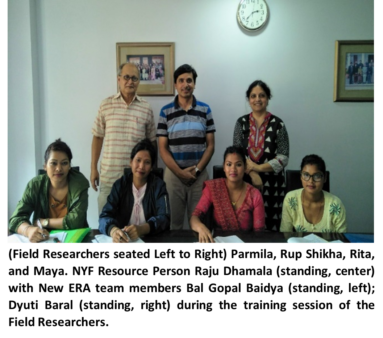
Click here to download the full independent study!
This study was conducted by an independent group of field researchers in 2019. They interviewed a sample of the women freed from the kamlari practice through NYF’s efforts, focusing their questions on topics linked to NYF’s mission: health, shelter, education, and freedom/empowerment.
During the 20-year Empowering Freed Kamlari program, NYF rescued 12,932 girls from domestic bondage. At NYF, we try to focus on individual stories as much as possible. But what about the other thousands of individuals served? If you’re interested in statistics about the broader impacts of our work, please read on!
We’re proud to report that the findings were incredibly positive! In almost all cases, the Freed Kamlaris and their families were not only doing better than they had before NYF intervened—they were doing better than national averages!
Here are just a few highlights:
Health
Other than offering mental health services through Ankur Counseling Center, the Empowering Freed Kamlaris program was not focused on health or health services. But researchers were surprised to discover the ripple effects of NYF’s focus on education.
Women impacted by the Empowering Freed Kamlaris program report much higher than average access to health education and resources for themselves and their families. For example…
Freed Kamlaris are having fewer children than their mothers did—an average of 1.5, which is lower than the national average. They report using family planning methods to ensure their families don’t grow larger than they can support.
Of the Freed Kamlaris with children, 88.7% delivered their last child in a healthcare facility, 97.2% had at least one prenatal checkup, and 82.4% had four or more prenatal checkups. A whopping 93.4% had had all of their children fully immunized as recommended for their age. All of them had had their children at least partially immunized.
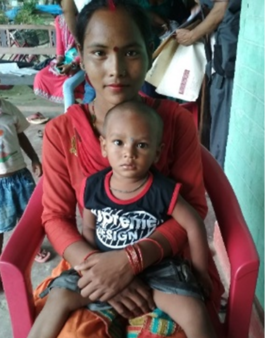
(Above, a 20-year-old married Freed Kamlari shows off her one-year-old son during her interview.)
Shelter
Extreme poverty was the main reason families reported for bonding their girls into the kamlari practice. NYF worked to ensure better economic resources for the girls we served, but home-building was not part of our programming.
Yet now, over 80% of Freed Kamlaris and their families live in homes constructed at least in part with “improved” materials. This includes at least one (and often a combination) of materials like galvanized sheet roofing (instead of thatch), cement or stone flooring (instead of earth), and brick or cement walls (instead of mud or bamboo).
Additionally, 90% of these families have access to sanitation facilities (plumbing) within their homes. Of the 9.5% using outhouses instead, many reported that this was intentional. Such facilities inside the home can be considered “polluting” for religious and cultural reasons, and many of the Freed Kamlaris rescued in early years reported that being forced to clean modern toilets was among their most demeaning experiences as kamlari.
When asked about their household’s main source of energy for lighting, 91.3% used electricity—a high proportion, indicating relative affluence. But 6.5% of the Freed Kamlaris surprised the researchers by reporting their use of solar panels! Off-the-grid energy sources were so unexpected, they had to be added to the list of options on field researcher questionnaires.
Improved housing is one of many ways these empowered women have leveraged their education and economic power to better their own lives.
Education
Education was a primary focus of NYF’s Empowering Freed Kamlari efforts from the very beginning. The earliest girls rescued returned home because NYF promised their families a piglet or goat in exchange for their daughters’ freedom to live at home and attend school.
The response was so strong that classrooms in the Terai region of Nepal were soon overwhelmed with too many students. Some in local government complained that NYF was causing problems for the school system! NYF responded by building 61 additional classrooms between 2004 and 2014 as well as ensuring schools had access to sufficient trained teachers, toilets, drinking water tanks, and furniture.
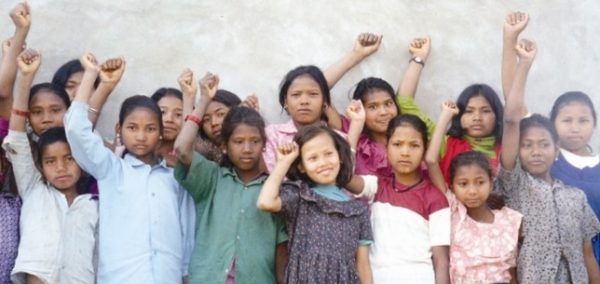
(Above, a group of newly-freed Tharu girls prepare to enter school in 2003.)
NYF also established and ran “catch up” classes to help young girls deprived of early education during their kamlari years. These courses ensured students could succeed alongside classmates close to their own age, instead of forcing teenagers to attend school with kindergarteners.
Now, Nepal’s national literacy rate stands at 67%. Among Freed Kamlaris, literacy is at 97%.
The average Nepalese adult today has completed 4.9 years of education. Among Freed Kamlaris, the average is 8 years—and rising, as 22.4% of Freed Kamlaris are still in school! About 30% of these women have completed grade 10 (the rough equivalent of finishing high school in the US).
Nearly two-thirds of the parents of Freed Kamlaris—61%!—had begun sending their sons to school once they saw their daughters going.
About one in three Freed Kamlaris have completed a vocational training course or received technical education in a field like engineering, computer technology, health care, dressmaking, poultry farming, or screen printing.
Around 4,000 Freed Kamlaris have received additional training through NYF in community leadership, cooperative management, organizational development, and entrepreneurship.
Just under 90% of Freed Kamlaris named educational opportunity as a way their rescue had improved their lives.
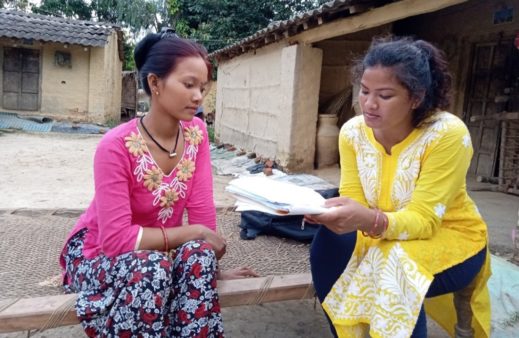
(Above, a Freed Kamlari, in pink, tells a field researcher about life since her rescue. All of the field researchers were women fluent in the Tharu language.)
Freedom
In many cases, freedom comes from education and economic empowerment.
Family members of the Freed Kamlaris reported that 92.3% of these women are currently contributing to household expenses (and remember, this includes the 22.4% who are attending school!). A similar number—91.1%—said that their family’s economic condition had improved in the last 10 years.
These families say the economic improvement came from their newfound ability to buy their own farmland or rent a larger area of sharecropped land, from the ability to start small businesses, or because of the employment of a family member.
About 29% of Freed Kamlaris are either employed or own a nontraditional business, including nontraditional crops like henna and mushrooms. This may seem like a low number, but the Tharu people are primarily a culture of farmers—so 29% is an enormous uptick!
Those Freed Kamlaris who have chosen to continue following the agricultural path are reporting huge advances as well. A full 75.1% of their families grow enough food to make their families entirely or almost entirely self-sufficient year-round through farming alone—an enormous blessing in tough economic times like the world is experiencing now.
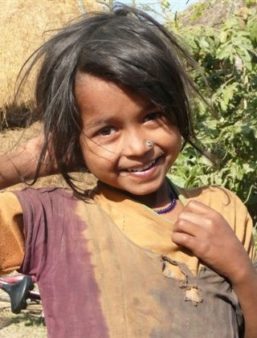
(Above, a young Tharu girl grins at the camera. Taken during the early years of NYF’s involvement with the Tharu people, this photo captures a moment very soon after this child’s return from her time as a kamlari.)
But freedom is also an internal experience—confidence in oneself and the ability to make decisions.
Researchers asked Freed Kamlaris whether they were allowed to make decisions in important areas of their lives: what age to marry, who to marry, whether or not to attend school, subjects to study in school, what career or job to pursue, and how to spend one’s earnings.
The area of least empowerment was what age to marry—90% of Freed Kamlaris were empowered to choose when to marry. (A main focus for the Freed Kamlari Development Forum is combatting early marriage in the region.)
When asked about subjects to study in school, 100% of these remarkable women reported they were empowered to make their own choices.
Freed Kamlaris were also found to have a high level of self-confidence that surprised the Nepalese researchers. These women were much more confident in themselves and their futures than the average Nepalese adult! The researchers also noted that this high confidence went hand-in-hand with grounded, realistic thinking.
A full 84.5% of Freed Kamlaris believed that their lives would improve over the next 5 years—and none believed they would be worse off.
Over 2/3 believed they would be able to take better care of their families in 5 years, and 54.7% saw themselves becoming more self-confident during the same time.
Ten percent of Freed Kamlaris hold leadership positions in community groups, and 21.5% are involved in social activism focused on the kamlari movement, ending violence against women, and ending early child marriage.
At NYF, we have so much to celebrate this Maghe Sankranti!
Thank you to every NYF donor for each thoughtful gift you have invested into these women and girls over the past 20 years. Your love—offered in the form of piglets, scholarships, start-up funds, vocational training, word-of-mouth, and so much more—have built opportunities and strength for a generation of young women. Dhanyabad! We are so grateful for your belief in these girls.
Now, 20 years after Som and Olga learned of the kamlari practice in Western Nepal, the journey continues for these incredible women as they step forward with new independence. The program’s valuable work is being carried forward with strength by the Freed Kamlari Development Forum—a Terai-based nonprofit led by the Freed Kamlaris themselves.
At NYF, we’re excited to step forward as well, putting 20 years of expertise to good use helping empower women and girls through new and continuing programming! We’re using the lessons learned over 20 years to continue serving communities of children throughout Nepal, ensuring their access to Health, Freedom, Shelter, and Education.
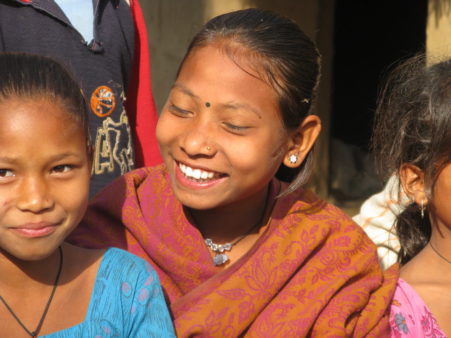
A freed girl grins in a bright moment during a 2009 celebration of the Freed Kamlari movement’s progress. Nepal would not make the practice illegal until 2013, but this girl knew the future was bright and change was on the horizon.
Former Kamlari Girls, Now Fight COVID-19 in Nepal
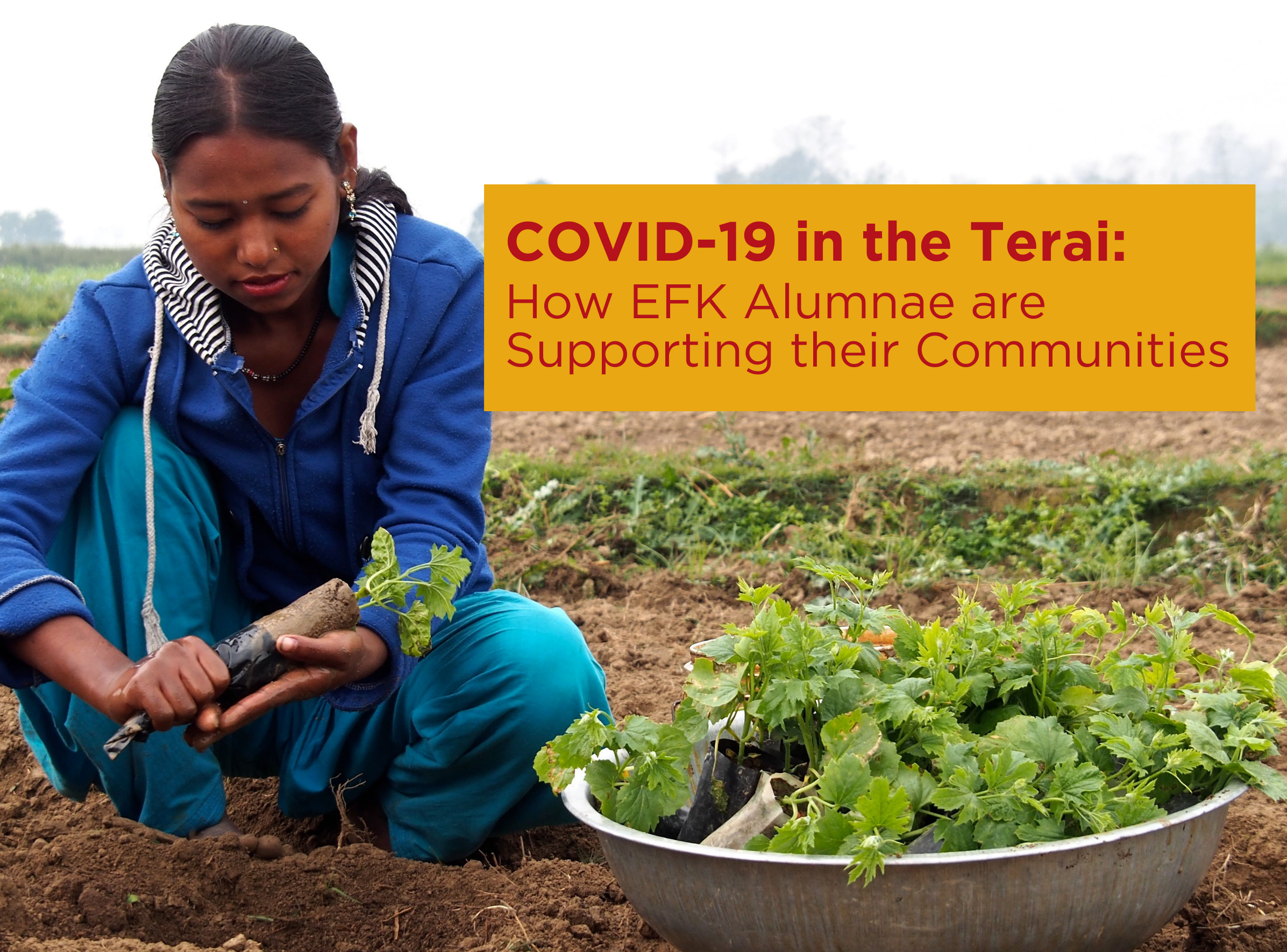
Former Kamlari girls and women help fight Covid-19 in Nepal. NYF is so proud these women are helping with this international crisis.
During COVID-19, in the Freed Kamlari Development Forum’s first months of independence from Nepal Youth Foundation (NYF), the Tharu community in western Nepal has faced new challenges. Because all Tharu communities live along the Nepal-India border, many young Tharu people support their families through work in Indian agricultural or factory jobs. When the pandemic began, these young people were sent away without work, and those without their own farmland have been unable to provide for themselves in the months since. Many small business owners in the region have had to shutter their stalls and workshops to comply with social distancing requirements. The economic impacts of ongoing border closures and travel restrictions threaten to harm the health and education of each family.
Fortunately, with their home-grown NGO established in the area, these communities have been surviving the pandemic together.
Early in the lockdown, the FKDF and our Ankur Counseling Center coordinated to mobilize the trained peer counselors within the Freed Kamlari community. These women were able to reach out by phone to individuals in their villages, providing emotional support and problem-solving guidance wherever possible.

Through their 47 locally operated co-ops, savings groups, and self-help groups, the FKDF has also been able to provide emergency financial relief to families. Twenty years ago, the kamlari practice seemed like the only way for families to pay back the predatory debts accrued in times like these, and sky-high interest rates made those debts nearly impossible to overcome. Agricultural co-ops and financial savings groups run by the community ensure such a thing can never happen again. Now, the Tharu people can provide each other with timely support and manageable interest rates designed to promote financial success in their communities.
Finally, the FKDF is leveraging its strong network of local government partnerships. Due to the incredible work they have already done, and to their connection with NYF, the FKDF is able to coordinate with local- and district-level government bodies to run community awareness programs against COVID-19. They’re hard at work keeping their families, villages, and futures safe.
That’s a special kind of freedom.
NYF is so proud of the work these women are doing during this international crisis. We are proud of the confident and capable leaders they have become. Thank you to each and every one of the NYF supporters who have invested in these incredible women over the past 20 years! Your loving gifts—whether funding piglets in the early days, sponsoring individual educational goals, contributing start-up funds for one of the locally-led co-ops, providing vocational training to hard-working entrepreneurs, or spreading the word within your own communities—have given these communities the ability to meet an unprecedented crisis with amazing resilience.
Dhanyabad! Thank you for your belief in the worth of these girls. The FKDF is proof that your #LoveWorks.
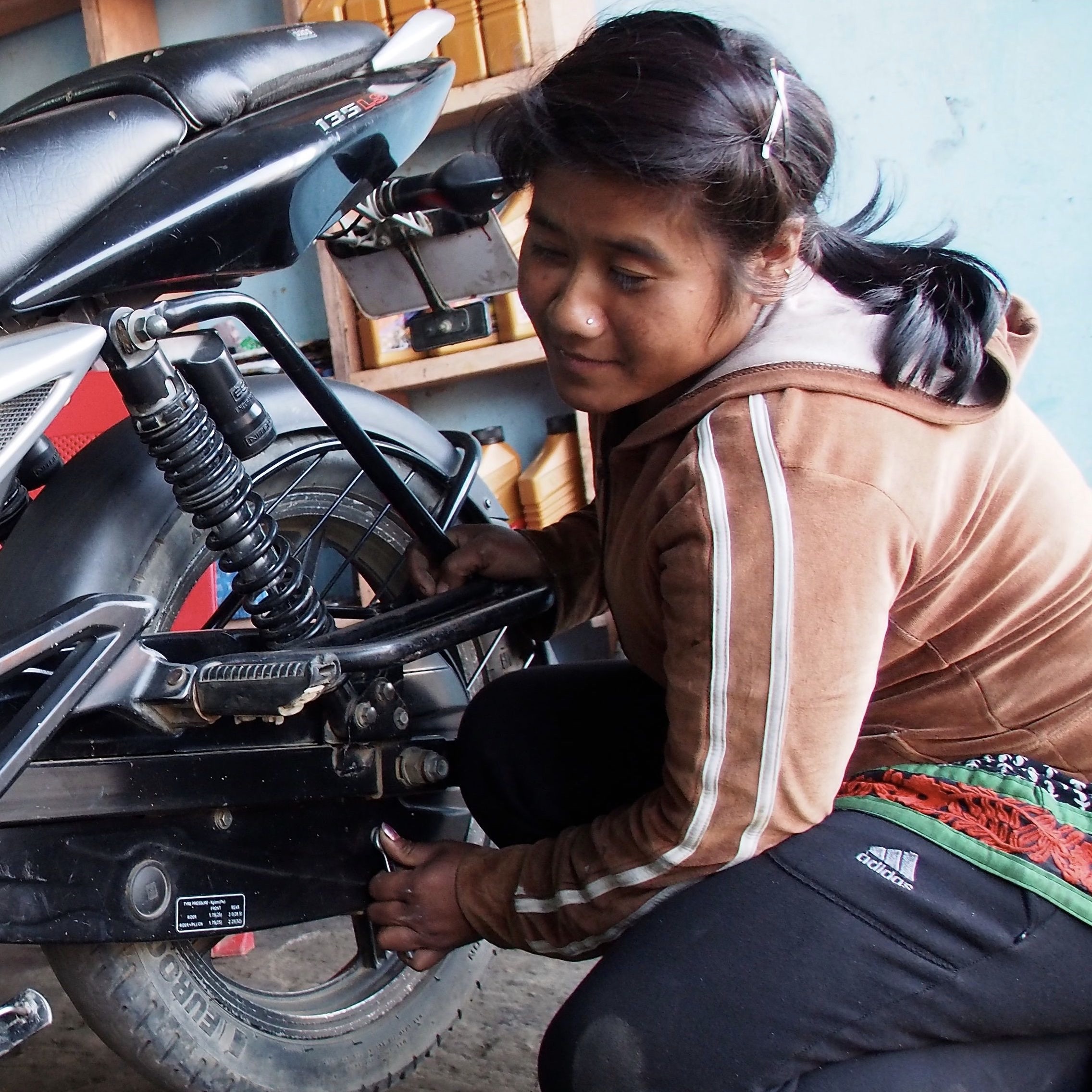
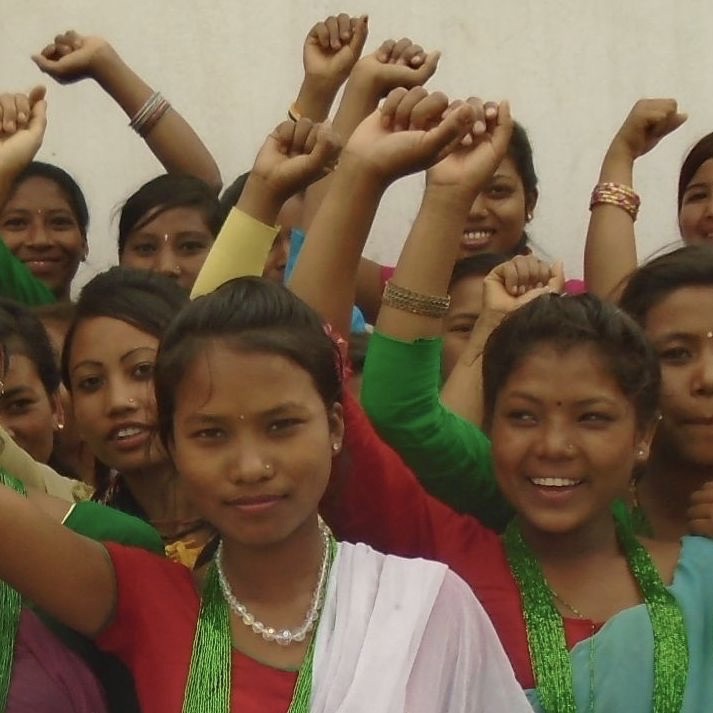
To continue supporting girls freed from kamlari bondage as they establish their own small businesses, you may do so through gifts to our Vocational Education and Career Counseling program. If you’d like to help us prevent early marriage during the COVID crisis, please consider a gift towards Access to Education. Donate here!
Tharu Leaders Transforming their Communities in Nepal

Tharu Leaders are led by incredible women who have experienced the kamlari practice first-hand. They are freed girls and women who are now now fully independent from NYF‘s Freed Kamlari Development Forum (FKDF). These leaders know the talents, struggles, and cultures of their communities better than anyone, and they are each determined to use their freedom, their passion, and their education to build a stronger, more equitable future for their daughters, neighbors, villages, and country.
We are pleased to introduce you to just a few of the amazing leaders from the Freed Kamlari community.
Urmila Chaudhary
Law student Urmila Chaudhary has won multiple international human rights awards for the work she has done on behalf of women. Her personal story has been featured in a documentary and in books, including Olga’s Promise, and in June 2020, she spoke at NYF’s virtual Founder’s Day celebration. She makes a point of investing prize money and royalties back into the FKDF community.
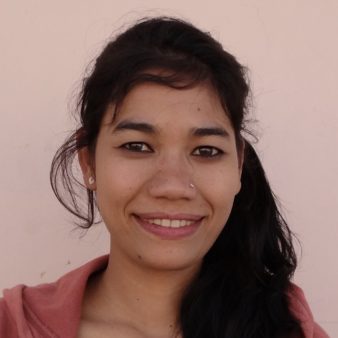
Urmila spent 12 years—age 6 to age 18—in indentured servitude. When she finally gained her freedom, she set to work right away working to free other girls, speaking against unjust landlords, advocating with parents, and defending children from community members who believed kamlari was the duty of all Tharu girls. Urmila has withstood challenges and threats. She has been injured during protests on behalf of young girls. These obstacles have helped her grow into a forceful, confident leader who is unafraid to confront injustices.
Urmila has dedicated her life to expanding women’s and children’s access to the legal resources that will help them fight oppression.
Dilkumari Chaudhary
Dilkumari Chaudhary is passionate about educational access, skills development, and entrepreneurial potential. She’s earning her degree in Management, but she’s already won a Young Entrepreneurs Award in Nepal. The development of capital, she says, is the key to employment opportunities for youth in Nepal. She encourages everyone she meets to build a business, and she’s determined to provide the resources to make these dreams a reality. She served in FKDF leadership roles for 6 years—the same length of time she was forced to work as a kamlari.
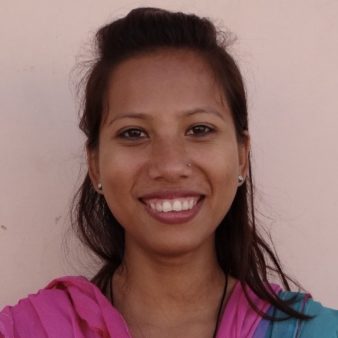
When Dilkumari speaks of potential and freedom, she backs up her ideals with practical tools to help individuals live their dreams
Besides putting pressure on the Nepalese government for change, Dilkumari has served her community by providing practical skills training to young women. She established a training center just for freed kamlaris in Nepalgunj and has trained over 250 young women there to date. She’s helped move her family away from dependence on cruel landlords by starting a small pig farm and a grocery shop. She’s used her earnings to educate her younger siblings and to purchase farmland outright, showing her community by example that women are more than capable of building generational wealth.
Manjita Chaudhary
Finally, Manjita Chaudhary is using her extensive experience to work as the chief advisor to the FKDF and its many local lending co-operatives. She was the founding president of the FKDF when she was only 24 years old, participating in policymaking, project design, budget planning, and program implementation.
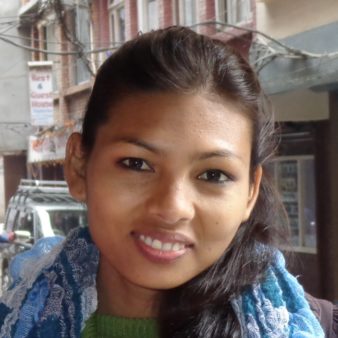
Manjita dreams of communities in which each household has at least one business owner, one co-op member, and one job in the community—a model she believes will maximize the income of Tharu families. According to Manjita, economic empowerment is crucial to break the cycles of poverty that led to the kamlari practice in the first place. She is one year away from completing her degree in Management, and she’s hoping to establish a bank in the very near future.
Banking is personal to Manjita, since her kamlari experience began with a loan from a bank that her father had no way to repay. Financial freedom and ethical, responsible lending practices will prevent the same horrors from befalling others in the future.
Each leader within the Freed Kamlari Development Forum has a unique story, special passions, and distinctive talents. Since NYF’s work with the Tharu community and their enslaved daughters began in 2000, these women have accomplished what many in Nepal thought to be impossible.
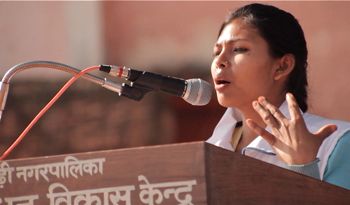
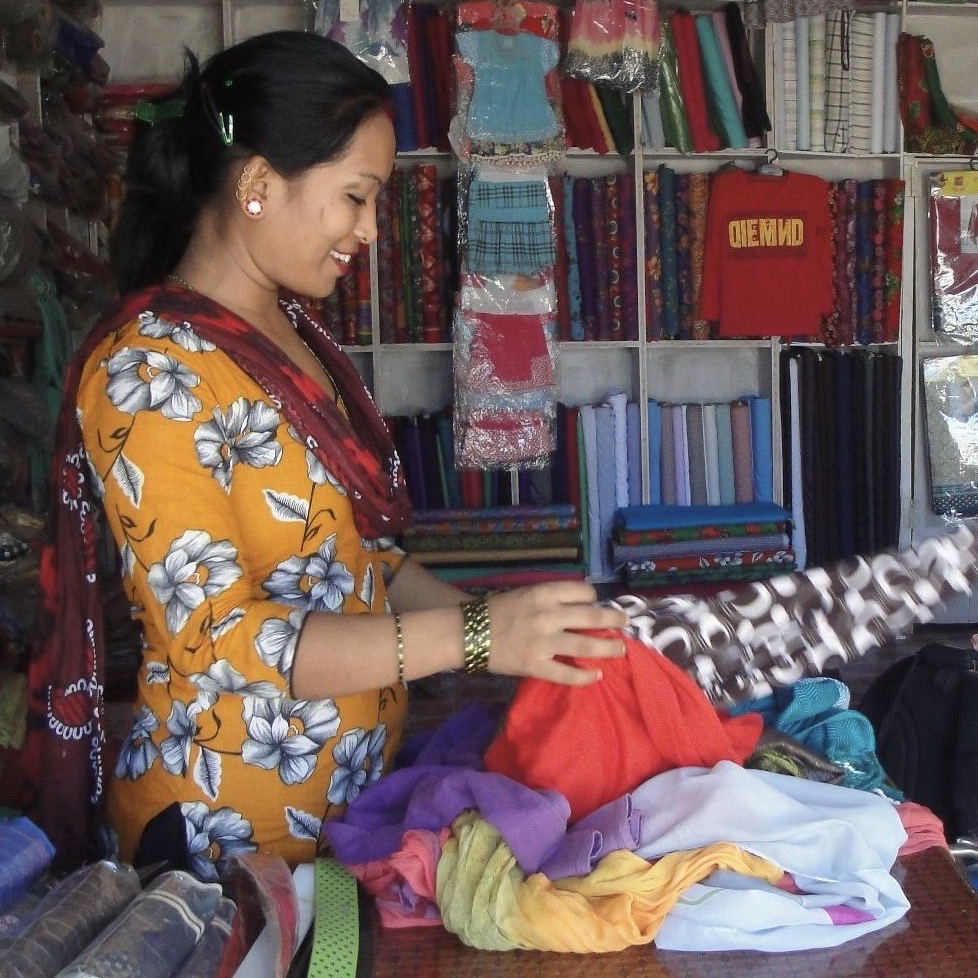
NYF is so grateful to each and every supporter who has participated in this program over the years. Your thoughtful gifts have allowed these young girls to blossom into powerful advocates for change. Each gift in support of freedom for Tharu girls has rippled forward to empower a generation. We are confident that they will continue along their path of empowerment for generations to come!
Dhanyabad! Thank you for your belief in the worth of these girls. These success stories – and many more! – are proof that #LoveWorks.
For a brief look at the FKDF’s COVID response, click here.
To continue supporting girls freed from kamlari bondage as they establish their own small businesses, please contribute towards our Vocational Education and Career Counseling program. If you’d like to help prevent early marriage during the COVID crisis, please consider a gift towards Access to Education. Donate here!
Indentured Daughters, Now Free, Enjoying Life After NYF Programs
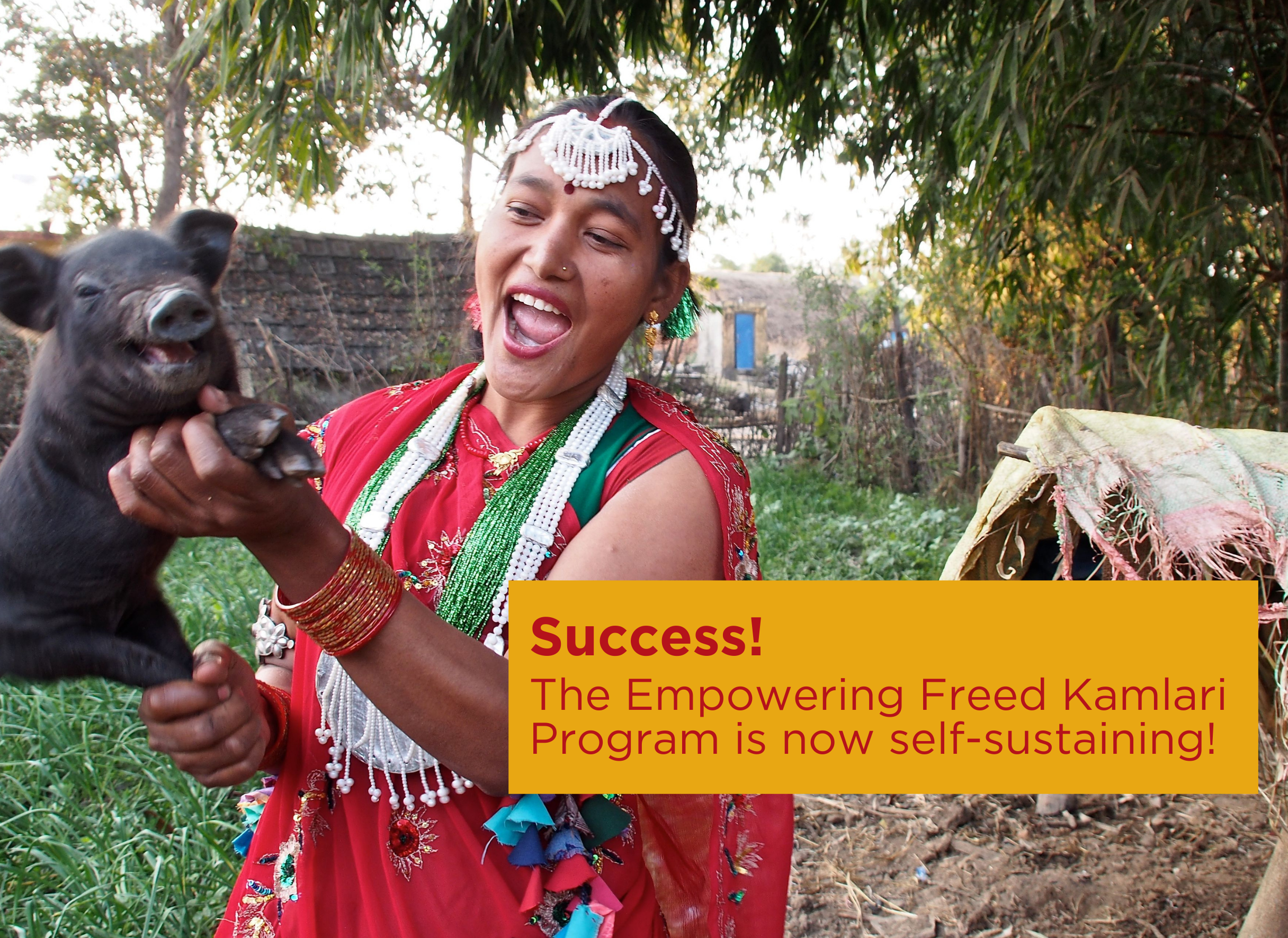
Many Indentured daughters in Nepal have completed NYF’s Freed Kamlari Development Forum (FKDF). It’s program designed specially to fight the practice of kamlari child bondage and to rescue, educate, and empower these young women. One of the greatest strengths at NYF is our commitment to sustainable programming. Each of our programs is designed to end.
After all, if we are truly successful at empowering a community, we will eventually no longer be needed—and when that day comes, it’s a time for celebration.
Like proud parents watching children become self-sufficient, NYF’s goal is to ultimately step back and watch each child, each family, each program succeed on their own.
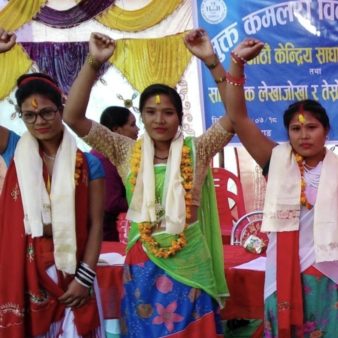
NYF is deeply honored and gratified to announce that that time has come for the Empowering Freed Kamlaris program. Effective in July 2020, programming designed specially to fight the practice of kamlari, indentured daughters – child bondage and to rescue, educate, and empower these young women will now operate under the control of the Freed Kamlari Development Forum (FKDF).
And who are the FKDF? They are the freed kamlari girls themselves—each of them eager and ready to give back to their own community by empowering their sisters and daughters to live dignified lives. The FKDF is a unique NGO with its own board, leadership, and programming goals. They’re currently focused on continuing education, early marriage prevention, and entrepreneurship.
With support from NYF, the FKDF has established 47 locally-led specialized co-ops and savings groups with nearly 13,000 members. The co-ops include self-contained credit groups, community vegetable farms, shared livestock, micro-lending opportunities, and more – allowing members to start small profitable businesses, purchase farmland and livestock, develop skills, and live their dreams.
Elected leaders within the community receive special leadership training and support. Regular delegations are sent to government officials in Kathmandu to ensure the promises made to the freed girls are being kept, including the distribution of special ID cards entitling freed kamlari women to special benefits.
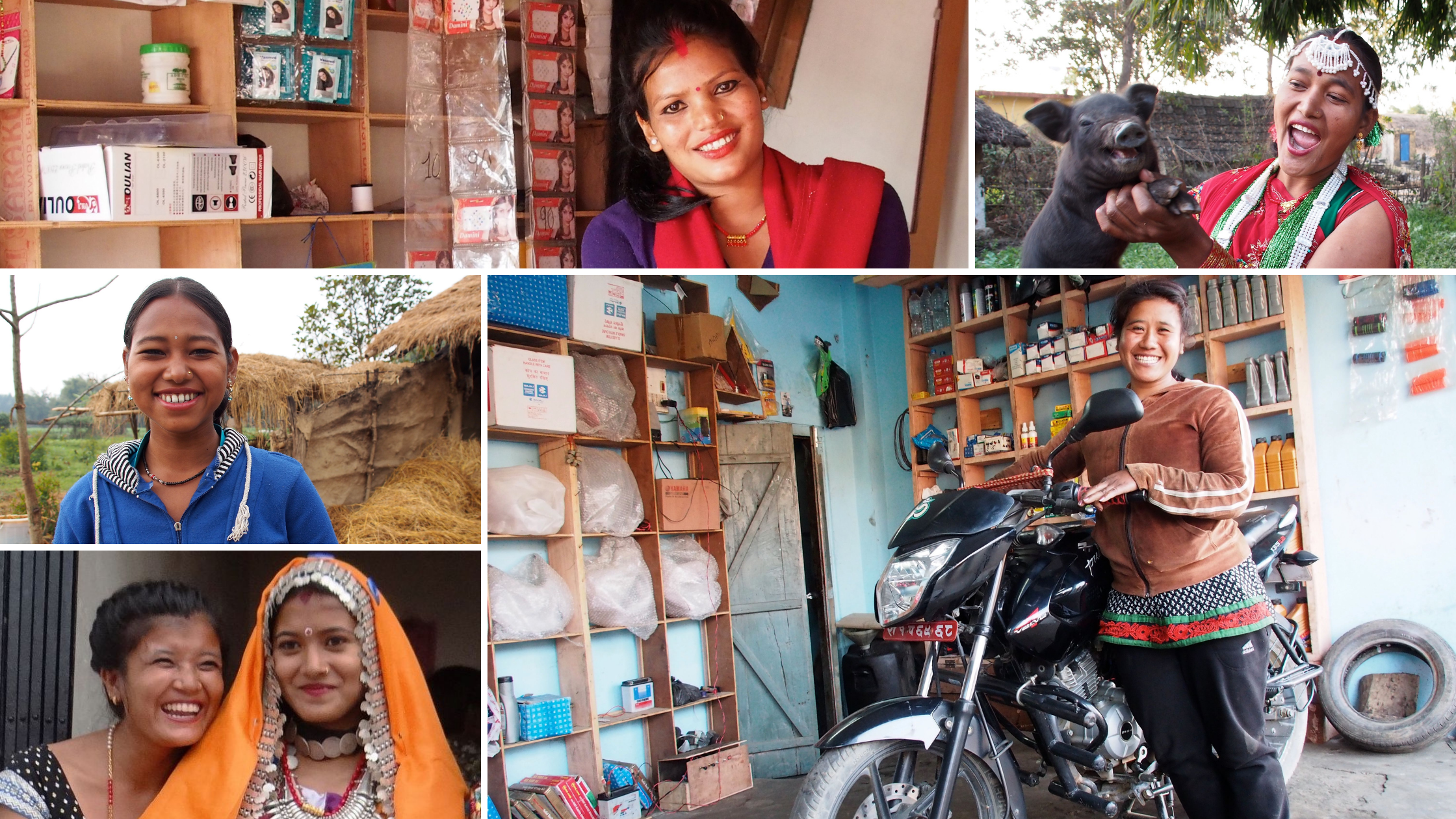
Each member of the Freed Kamlari Development Forum has a unique story, but for each of these women, a significant early portion was bleak, painful, and raw. Most were made to believe, in their earliest, most vulnerable years, that they were hardly worth anything. In later years, they wrote impassioned songs and poems asking why they had been born into such a life. That they could fight for their freedom, and the freedom of girls like them, was a revelation.
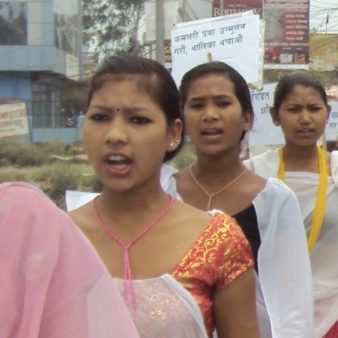
Yet when given the chance, these young women—many of them still girls—took to activism with intense courage and zealous grace. They boarded buses bound for Kathmandu and took back girls who had been sold. They raised their voices in street performances, opening their hearts to strangers in order to help others understand the violence of the kamlari practice. They demonstrated in the streets, even when doing so put them at risk of serious injury. Under the pressure of their empowered message of freedom and self-worth, the Nepalese government at last took action against the practice, forbidding child slavery in 2013.
Thank you to every NYF donor for each thoughtful gift you have invested into these women and girls over the past 20 years. Your love—offered in the form of piglets, scholarships, start-up funds, vocational training, word-of-mouth, and so much more—have built opportunities and strength for a generation of young women. Dhanyabad! We are so grateful for your belief in these girls. The FKDF is proof that #LoveWorks.
Now, 20 years after Som and Olga learned of the kamlari practice in Western Nepal, the journey continues for these incredible women as they step forward with new independence.
NYF is so proud of the indentured daughters turned leaders.
To read more about some of the incredible leaders within the Freed Kamlari movement, click here. For a brief look at the FKDF’s COVID response, click here.
At NYF, we’re excited to step forward as well, putting 20 years of expertise to good use helping empower women and girls through new and continuing programming! To continue supporting girls freed from kamlari bondage as they establish their own small businesses, please donate towards our Vocational Education and Career Counseling program. To support our ongoing COVID education response (which is helping prevent early marriage in rural communities), please consider a gift towards Access to Education. Donate here!